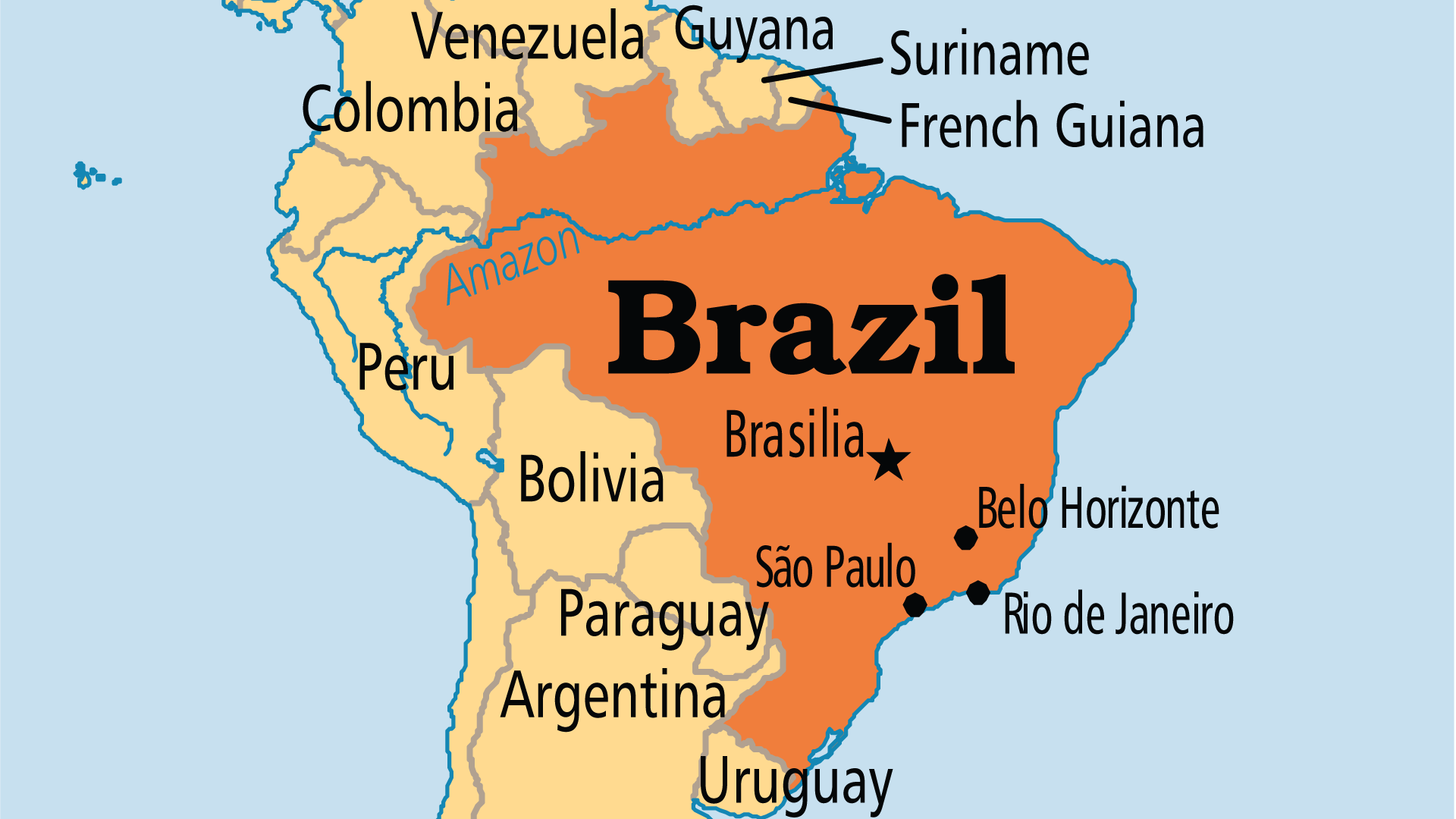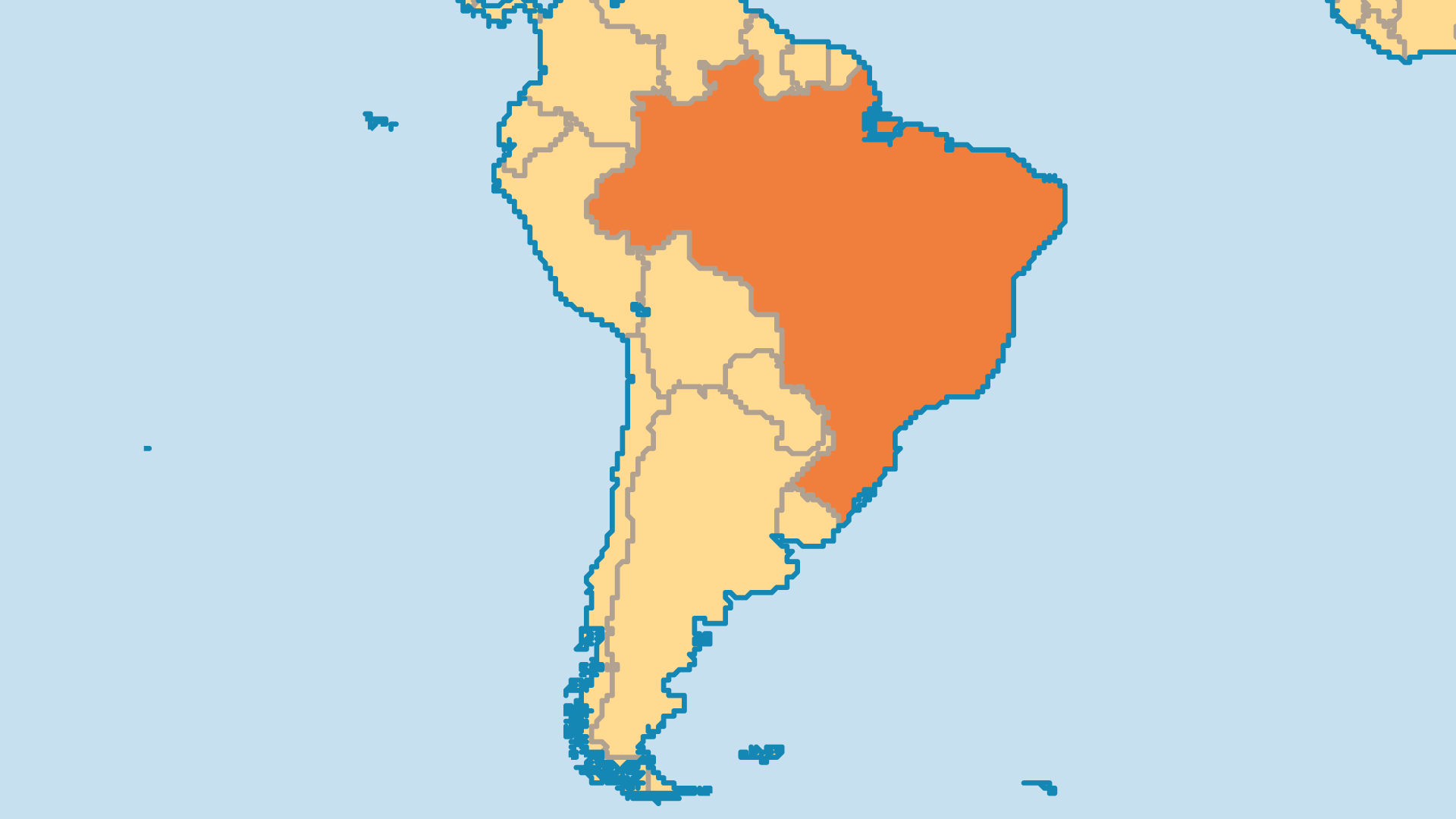Pray today
Many regions of Brazil still lack an evangelical presence. The poor and less-developed northeast region has the lowest percentage of evangelicals, especially Piauí and Ceará. Pray for greater response to Pentecostal outreach there. Cities have many churches, but many needs. Up to one-third of the populations of Rio de Janeiro and São Paulo live in crime-filled slums. The rich and powerful, and the ethnic minorities often have few evangelicals. The battles between ganglords and police often make victims of the innocent. Brazil has 8 million children at risk, 7 million child labourers, and 600,000 girls in prostitution. Some churches and agencies help children through orphanages and job training ministries, but it is not enough. Pray for Christian ministry to every area of need.
More
- Poverty still affects tens of millions. A significant proportion of city-dwellers still live in poverty-stricken, crime-ridden favelas, and the education and health care sectors are in serious need of improvement. The poor, especially street children and indigenous peoples, often suffer terrible discrimination and exploitation. Debt slavery affects up to 250,000 people (the official number is 25,000), especially in the Amazon.
- Crime is a serious problem - so much so that being "tough on crime" and prioritizing the safety of ordinary Brazilians has become a key part of the right-wing political platform. Brazil has the world's highest rate of firearm homicides and is one of the highest consumers of illicit drugs. Nearly 120 people a day were murdered in Brazil in 2022; a rate that, while still alarmingly high, is the lowest in 15 years. The police response has been brutally heavy-handed and rife with corruption, and the nation's prisons are notoriously overcrowded and violent. Unprecedented breakthrough, spiritual and social, is needed to turn this around.
Brazil is a spiritually open country, for good and for ill, and is probably more Spiritist than Catholic in underlying worldview. Although "non-religion" is actually the fastest-growing faith group, few of that category would be hardcore atheists. Most follow Afro-Brazilian cults (such as Candomblé, Macumba, Umbanda) derived from African animism and witchcraft, but "high Spiritism" (Kardecism) is more popular among whites. Only 1.3% identified themselves solely as Spiritist in the census, but around 10 million practice, and even one-third or more Brazilians visit Spiritist priests or guides; many quite happily practice Catholicism and Spiritism together. The ecstatic experiences, flexible practices and emotional mysticism give it great appeal to the Brazilian mindset. Pray for all spiritual falsehoods to be exposed as such and for Christ alone to be exalted as Lord in Brazil; pray for those in actual spiritual bondage to be delivered through Jesus.
Catholics in Brazil number more than in any other country, but the Church itself remains in crisis. The defection rate has slowed, but it continues to lose members to evangelicals, to Spiritists and to non-religion. By 2025, Catholicism could be a minority religion, having held 95% of the population in 1950. Around 70% of ex-Catholics are now evangelicals. Even within Catholicism, only a small minority remain traditionally Catholic and faithful in practice; many others are influenced by Spiritism, nominalism or the charismatic renewal. The grassroots "Base Community" movement, the engine room of liberation theology, has lost much of its drive, but nearly one million "Bible circles" persist, hosting studies of Scripture. Pray that the Bible and its truths may mould the lives of Catholics. Other points for prayer:
- A desperate shortage of priests. Of the current 18,000, many are foreigners. Another 100,000 are needed to meet all the needs; currently there is one priest for every 6,300 Catholics.
- The charismatic movement grows in strength, numbers and maturity; over 15 million are a part of this.
- The successes of evangelical denominations have stimulated a more people-friendly, contemporary worship and ministry and a greater growth of evangelical Catholics, as well as an increase in traditional mass attendance.
The emergence of evangelicals in Brazil has been dramatic. Yet despite the growth - from 2.9% in 1960 to 26.3% in 2010 - there are many prayer needs:
- Numerical rather than spiritual growth is the emphasis of too many groups, to the point of dishonest inflation of numbers and disregard for discipleship. As a result, churches have "multiplied", but congregations are filled with immature, unfed spiritual infants whose faith is overly based on emotionalism, petty legalism and the personality of leaders. Such zeal without maturity leads to spiritual error, nominalism, widespread church-hopping without commitment to a particular church and large-scale backsliding.
- Prosperity theology has shaped much of Pentecostalism in Brazil, with those on top of the pyramid enjoying celebrity status and lifestyles - as well as financial scandals - while millions of poor hold out for a miracle of healing or financial blessing. Pray for a right balance between expectation of blessing and daily sanctification.
- Leadership models are sorely lacking, as witnessed by the scandals and moral failures of some high-profile leaders characterized more by their wealth, power and lack of accountability than their humility and faithfulness. The celebrity bishop model is unsustainable, and there needs to be new ways of shaping and growing leaders who will be well suited for bringing discipleship and societal impact to Brazil's evangelicals.
- Effective appropriate training is a key to addressing the above issues. Rapid growth, especially among Pentecostals, has generated a dearth of trained leaders. With over 200,000 evangelical congregations, traditional education models are inadequate to meet the need. Many are making pastoral training a top priority now; Baptists, Presbyterians and Foursquare are examples of such groups developing new seminaries, TEE programmes and in-service training opportunities. AoG has over 17,000 students on 420 extension campuses, but even this is not enough to meet the need. Pray for wise and creative solutions to this challenge.
- Unity. Evangelical denominations have mushroomed in the last 20 years as new groups form with almost every theological disagreement or inter-personal conflict. There could be over 4,000 distinct evangelical groups. The success mentality based on numbers and income can induce rivalry and jealousy. Pray for the Evangelical Association of Brazil to be a means of fostering lasting unity, fellowship and prayerful cooperation.
Transformational ministry is greatly needed in a nation ravaged by inequality, injustice, crime, immorality and HIV/AIDS. While mainline churches have a long association with compassionate works, evangelicals have done far too little to effect transformation. Only 12% of churches have any kind of social programme, and most of those are very limited in scope. Once evangelicals address these challenges on a massive scale, then they can consider themselves to truly be "good news people".
Brazil has become a leading mission-sending nation with great emphasis on the unevangelized and on church planting. Brazillians' faith, enthusiasm, adaptability and talents (football, music, dancing) open many doors, but poor preparation and support can undermine all these. Pray for:
- More who will go to the field and more churches who will send them. While just under 2,000 is a formidable number of missionaries sent, given the mass of Brazil's evangelicals, the sending ratio is actually very poor. The large majority of congregations have no involvement in missions, and the explosive growth of missions in the 1980s and 1990s may not be characteristic of the current situation. There is still great and untapped potential!
- Mobilization and facilitation. Associação de Missões Transculturais Brasileiras (AMTB) mobilizes churches into mission and serves as a resource and linking network for 35 of the largest Brazilian cross-cultural mission agencies. Associação de Conselhos Missionários de Igrejas (ACMI) aims to help local churches set up viable missions structures, programmes and channelling mechanisms.
- Missionaries sent from Brazil. Pray for their recruitment, their effective training and preparation for the field and their long-term survival and fruitfulness in cross-cultural situations. More and better training programmes are improving the level of adequate preparation that was previously lacking for many workers. Unrealistic expectations and traditionally poor levels of pastoral support are also being addressed.
- Sending churches to increase their long-term commitment to pray for, send and support missionaries. Prayer support is often very strong, but at times promised financial support never arrives. Attrition from Brazilian missions has been disproportionately high in the past, and better support from the home end is an integral part of the solution to this.
Brazil became a leading mission-sending nation in one generation. Almost 2,000 Protestant, Independent, and Anglican missionaries went out. Brazilian faith, energy, adaptability, and talent (sport, music, dance) opens doors! Unfortunately, poor preparation and lack of support sometimes hinder their efforts. Pray for more churches to have a vision for missions. Ask the Lord of the harvest to send out and provide for Brazilian missionaries. Pray that they persevere and bear fruit.
The indigenous Amerindians have endured centuries of prejudice, oppression, massacre and exploitation, which continue to this day by encroaching woodcutters, gold prospectors and ranchers. Their unique cultures are disintegrating through despair, disease, substance abuse and suicide. Six million indigenous people in AD 1500 now number a mere 700,000, with many reduced to small bands in inaccessible areas. The large majority of these tribal groups now number less than 1,000 people. Fully 70% of Brazil's unevangelized peoples live in the Amazon basin. Pray for:
- A change in attitude of Brazilians to see these peoples as national treasures rather than as nuisances who slow the rapid but shortsighted development in the Amazon and Pantanal. Government laws and policies are in place to prevent the exploitation of people and land, but they have not been effectively implemented.
- A balanced approach to protection that actually helps the Amerindians. Their isolation has yielded their immune systems highly vulnerable to outside diseases. But occasionally, those (self-)appointed to "protect" them instead perpetuate their misery by enforcing their isolation and preventing them from choosing their own appropriate development and integration into the wider world.
- The growth of Christian networks among these peoples. CONPLEI (National Council of Evangelical Indigenous Pastors and Leaders) is a rapidly expanding indigenous, evangelical movement for tribal groups. CONPLEI gatherings host over 1,000 Amerindian evangelical leaders from around 50 tribal groups.
University students face many pressures, from educational to moral to financial. There are more than 8 million undergraduate students in Brazil, a number nearly double that of 20 years ago. Pray for more workers to minister to them. There are many dynamic Brazilian-originated ministries for students and youth. Most are connected with specific churches or denominations, but others, such as Tribal Generation, work across all such boundaries. US-originated ministries such as ABUB(IFES), Cru and Navigators are also active in helping students come to the Lord, building them up in the Word and encouraging missionary vision. ABUB has a significant publishing organization.
Scriptures. A large proportion of evangelicals read the Bible daily. The Bible Society alone sells/distributes over 5 million Bibles per year; the Gideons distribute 6.7 million NTs per year. Through these and other groups, up to 300 million Scripture portions and pieces of Christian literature are distributed each year.
More Information
- Get all of this content and daily notifications in our free mobile app. Download here ›
- Sign up for a daily e-mail that gets you the featured prayer point of the day straight to your inbox.
- This content is a curated selection of points from our book, Operation World. Find out more about it and all the rest of Our Publications ›
Content taken or adapted from Operation World, 7th Edition (2010) and Pray for the World (2015). Both books are published by InterVarsity Press. All rights reserved.


